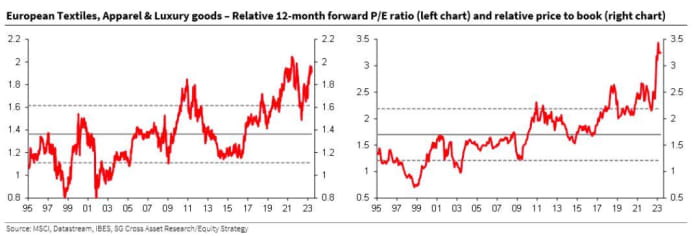This post was originally published on this site
A selloff in European luxury goods stocks continued on Wednesday, with $11 billion slashed from the wealth pile of the world’s richest man, as anxiety over one of the hottest investment corners this year continues to grow.
The losses were sparked Tuesday after Deutsche Bank cautioned investors to get more selective on the sector, partly amid softer demand from U.S. consumers. Shares of LVMH Moet Henessey Louis Vuitton
MC,
slid 5% on Tuesday.
It was the worst one-day performance in more than a year for LVMH. And while Chairman and CEO Bernard Arnault remains the world’s richest man with a wealth pile of $192 billion, his fortune dropped $11.2 billion on Tuesday, according to the Bloomberg Billionaires Index.
Read: Who is Bernard Arnault, the world’s richest person with a $210 billion fortune?
Bets on the luxury sector drove LVMH to become the first European company to hit a $500 billion market cap last month.
LVMH wasn’t the only big loser, with Hermès International
RMS,
Moncler
MONC,
Swatch Group
UHR,
Cie. Financière Richemont
CFR,
Gucci owner Kering
KER,
and Salvatore Ferragamo
SFER,
also sliding. Wednesday saw continued losses for the sector, with LVMH down near 2% and Hermès off 1.6%.
Alongside Deutsche Bank’s caution, a team at Société Générale led by Roland Kaloyan, in a note also dated Tuesday, defended their decision to downgrade the sector to neutral from overweight in mid-February.
Those analysts said the sector still has much going for it — China exposure, high organic growth at a time of slowing economic growth, strong pricing power amid inflation pressures and robust balance sheets as interest rates are rising.
However, these stocks are eye-watering expensive, said Société Générale, noting the sector is trading at a 12-month forward price/earnings ratio of 24.6 times, which is a 92% premium to the European market and near a record high of 105%.

Société Générale
“Also, the latest reporting season has highlighted that the luxury goods sector is not totally immune to economic deceleration, with slowing trends in the U.S. and Korea apparent in the latest releases,” said Kaloyan and the team. “Looking ahead, the base effect for pricing and product mix should be less supportive from 2H23 [second half of 2023], and the exceptional base effect from China should disappear starting early next year.”
Should the European luxury selloff steepen, another billionaire will be waiting in the wings to take Arnault’s place. Tesla
TSLA,
CEO Elon Musk, who has been trailing behind the luxury king, is at No. 2 with a current net worth of $180 billion. His wealth has increased by around $43.1 billion this year versus $29.5 billion for Arnault.


